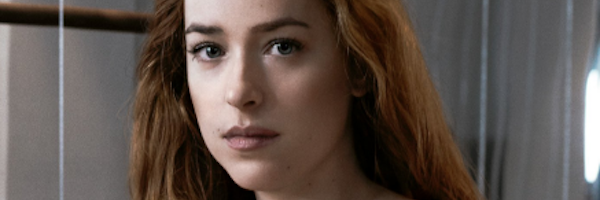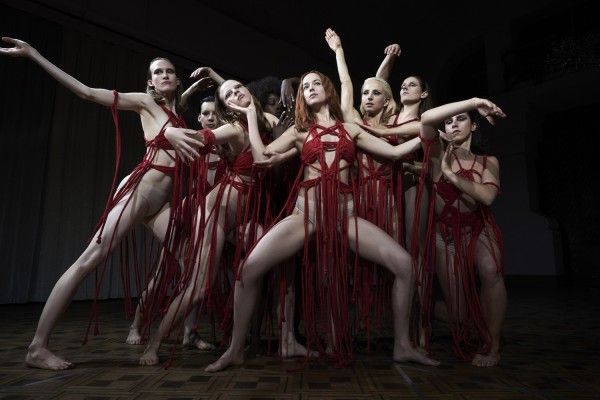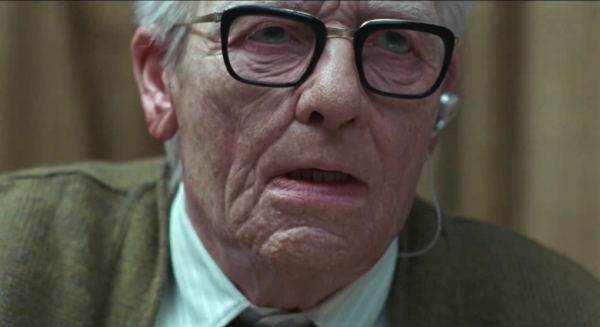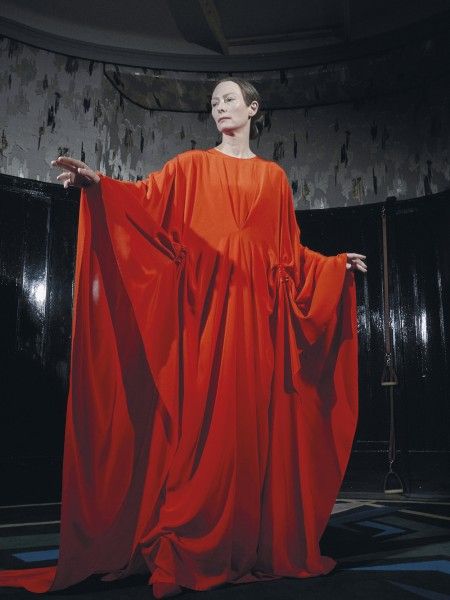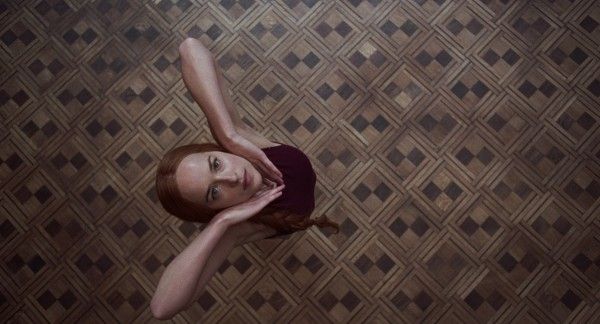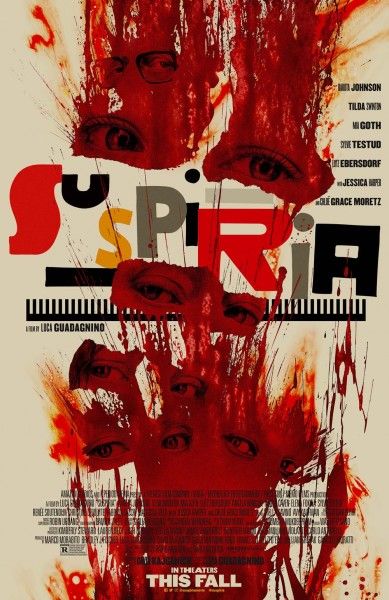Be aware there are spoilers for Suspiria (2018) in the interview below.
At long last Luca Guadagnino's Suspiria remake is in theaters nationwide. Which means a whole lot of people are probably wondering what the hell they just witnessed. Inspired by Dario Argento's iconic 1977 film of the same name, Suspiria follows Dakota Johnson's Susie Bannion to a world-renown dance academy where she meets the mysterious instructor Madame Blanc (Tilda Swinton) and discovers a coven of witches. Rich with themes of revolution and meditations on psychoanalysis, religion, and power, Suspiria is a movie that settles into your mind and rattles around, leaving lots of questions to be answered.
After I saw the film at Fantastic Fest, I had an opportunity to sit down with screenwriter David Kajganich (who also co-created AMC's fantastic The Terror series this year) and actress Jessica Harper, who originated the role of Susie Bannion in the original film and returns to the world of Suspiria with a key cameo role in the remake. Naturally, I took the opportunity to try to get some answers. We discussed where people should start looking for answers at the end of the film, why it was important to set the film in 1977 and how the state of the world in that era ties to the themes of the film, and what to make of Dr. Josef Klemerer -- the film's psychoanalyst played by Lutz Ebersdorf (aka, Tilda Swinton under pounds of prosthetics. There's obviously a lot of decipher in Suspiria, but Kajganich's comments certainly helped me start putting the pieces together. Check out what they said in the interview below.
Obviously, this is a film that people are gonna have a lot of questions about, so where do you guys think people should look to try to find the answers?
KAJGANICH: That's a great question.
HARPER: To heaven.
KAJGANICH: Gosh, I don't think I have a thoughtful answer to that very thoughtful question.
HARPER: They just have to see the movie five times. Then it will all become clear.
KAJGANICH: I suppose to me the first thing if I were just in the audience watching it for the first time I would want to make some choices about how I felt at the end. Do you know what I mean? You have this crazy scene where Susie becomes someone you're not expecting. The way that it was scored, the particular song that Tom wrote for the film, it's not a horror song. Do you know what I mean? It's very kind of bittersweet empowering piece of music.
HARPER: Gorgeous piece of music.
KAJGANICH: Then that's followed by the scene where Susie may be giving a gift to Klemperer in the form of wiping his memory or it might be her first Fascist act. I think that's where I would start. I would want to know how do I think I'm supposed to feel at the end of this film and go from there I suppose.
The Klemperer character is so interesting and something people won't be expecting him or his relationship with his wife. I'm curious from your perspectives why is that such a crucial element to the film and where did that sort of come from when you re-envisioned the story?
KAJGANICH: Well, we knew that a lot of this story was going to be about the struggle between kind of the past and the future over the souls of the present in a way, and we knew a large part of this story was going to be about how ... without being too grandiose about it ... how Fascism works exactly and Fascism works because a lot of people stand by and let it work or are drawn to it because they're emotionally invited in somehow and they don't have to commit crimes themselves.
All they have to do is really just standby in support of them. Klemperer is sort of the opposite character. He's a witness to a horrible period of history. He's lost his wife to the second world war. He doesn't know how her story ended and continues to believe somehow that she might be alive, which is a huge act of denial on his part.
He doesn't factor in how he was complicit in her disappearance. He doesn't factor in how he was complicit in standing by and letting an entire nation come apart in terms of its dedication to human values. So we knew that he was going to be a part of the story in that he was going to help us articulate to an audience what it means to stand by and let evil things happen, that when called upon to react he finds he can't somehow. It's too big. It's too much.
So when we were talking about ... we knew we wanted Jessica to come back for the film and we knew it had to be something quite special. When we were out on the project and realized there was going to be this moment when the witches were going to lure Klemperer back to the company to be the witness for their final rights, that they would do so by giving him his wife back for the evening and how kind of cruel that was when she's taken away, and he's actually confronted with the fact that he probably had some ... he was instrumental in some sort of passive way in her being seized in the first place. That that would be a fantastic part for Jessica as a kind of ... we were calling it earlier a hologram of the witches sent Klemperer as bait to lure him in. Somehow when Anke appears in the film, she's meant to carry with her all of this nostalgic sweetness that curdles right in front of you. We thought, oh, that's ... if Jessica is willing to do that part, that would be perfect.
What was it like for you to film that sequence? Because cause it's a brief cameo but it's so emotionally powerful.
HARPER: Oh, I loved doing that. I love the whole idea of being part of this kind of emotional core and movie, and having this linked to this character, Klemperer, who is so ... I think we were saying earlier, he's sort of like the rest of us outside of this swirling madness within the school of witches and blossoming witches and all this stuff going on. There is this man and this incredibly sweet love story that just provides a really nice thread to the rest of what's going on. I love being a part of that. I really felt ... you know, this poor guy. I read the script, and I just thought, "This is just ... it's agonizing in the best way, such a thing can be in a movie.” Really just such a compelling emotional story.
Let's talk a little bit about the time period. It's set in the year the original film was released, but obviously you're also pulling into a lot of political elements as part of your story. Why was that a critical aspect of the story you wanted to tell?
KAJGANICH: Well, I mean, ultimately the story ... Susie's story is about the transference of power from the old generation to the young. It happens in a way that is ... I mean, she is a character who really comes into her own in front of you in the last scene, you know, the last big set piece in the film. It seemed really important to not judge that moment as purely positive or purely negative.
The backdrop of Berlin in 1977 and all the political turmoil that was going on at the time as the young generation was starting to look at the older generations and hold them accountable for how they had participated in, you know, passively or otherwise in the war. It seemed like the perfect way to tell an audience to somehow communicate to an audience that this is the story about the transference of power from the old to the young.
That was going to be really crucial to Susie's story but you wouldn't know how. You wouldn't know that's what you were being prepared for somehow. So it was really useful in that way in terms of the plotting of the film. But thematically obviously it has everything to do with the film, what we wanted the film to be about.
Jessica, how does it feel for you to return and then see this film set in the year that your film was released and see it transformed into a new story of female empowerment for a new generation?
HARPER: Well, I love it. I love knowing the contrast between this vision 40 years ago versus this new one now, reflecting on how does it change or not. In both cases there's a male and female power which is really -- back then when in '77 -- arguably even more impactful in a way, because the times were so different. Now what you see in this movie is ... well, it's more forceful in some ways. But, again, reflecting I think about what we're going through as women now, right now, and then to see this, commenting on that is so interesting.
I've just run out of time with you but I understand you have a new Podcast project coming up, Jessica.
HARPER: Oh, thanks so much for asking. I do. It's a childhood memoir but it's only an audio. It's not going to be a hard copy, just a podcast, 10-episode podcast. The full episodes won't launch until February, but I'm starting a feed in November of sort of preliminary material and trailers and stuff. So people can subscribe in November. It's called Winnetka ... thank you for asking ... which is the name of my hometown outside of Chicago where I came of age, and it features the voices of the characters in the memoir, i.e., my family.

